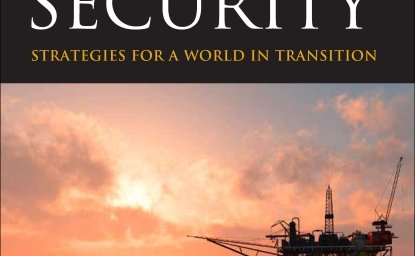Chapter 22 Update: National Security and Climate Change
I’ve been asked to write a few pages of commentary, reflecting upon ideas contained in the chapter I wrote in 2013, for Energy and Security: Strategies for a World in Transition. To do this, however, requires a kind of running start beginning further back in my past, rather than a standing jump from the near-present. Three documents are involved: “Implications of Severe Climate Change in 30 Years”; [1] “Energy, Homeland and National Security”;[2] and “National Security, Energy, Climate Change: New Paradigm, New Strategy, New Governance” (the chapter cited earlier).[3]
• The first of these essays dealt with the policy implications of a scenario involving severe climate change over a thirty year period. The scenario itself was prepared by a panel of scientists. I was a member of a panel of foreign policy experts, each of whom received a specific scenario. My assessment was that climate change at the level described in the “severe” scenario would threaten the survival of industrial civilization by destroying the environmental niche in which it existed. With the passage of time, I have seen no reason to change that assessment – only to reinforce it.
• The second essay examined how the problem of assuring access to oil and gas from foreign sources had been a powerful force in the shaping of our entire strategic conception of national security. It concluded that this once-adequate conception now suffers from major flaws, chief among them a tendency to isolate the security, economic, domestic, and foreign dimensions of energy, and to treat these as separable rather than intimately interactive forces. It concluded that US leadership for “purposeful management of the global environment” was a missing and key element, and that the executive branch of our government lacked structures needed to produce an integrative vision. This observation related to my (separate) work on a concept called Forward Engagement, which focused on the need for systematically coupling foresight to policy. [4]
• The third essay argued that the United States would have to experience a paradigm shift in its thinking about climate change, energy, and national security as parts of a global, composite strategy. It predicted that this paradigm shift was in fact approaching, because of a combination of drivers: (1) a sudden shift in public awareness of the implications of climate change as a co-equal, if not a dominant factor in national security; (2) extreme political turbulence in the Middle East;
(3) emerging geostrategy in the Arctic and the South China Sea, related in large part to maneuvers over future access to oil and gas; (4) climate change manifesting itself forcefully now, as opposed to later; and finally (5), radical new possibilities as a result of the fracking revolution.
This chapter then identified two sets of actions the United States should pursue in its own interests: (1) those that we could take on our own; and (2) those that could only be undertaken in concert with others. For example, in the first category
• Plan now for drought as a new normal.
• Plan now for higher sea levels and storm surges.
• Plan now for an ultra-low carbon, ultra-high efficiency energy system in the United States.
• Plan now for climate change as a bona fide threat to national security, with very specific responses needed in order to be prepared.
In the second category, I listed actions needed in order to strengthen the international response to climate change. Among them:
• Accelerate research.
• Develop the means for collaborative international planning and action for fast-breaking major threats in the immediate present, to public safety and international order.
• Develop multiple, concurrent approaches for slowing the onset and diminishing the peak impact of climate change (for example, methane emissions, soot deposition).
• Global instrumentation to permit measurement and management of factors contributing to, and emerging from, climate change.
I concluded by stressing the need to institute anticipatory forms of governance within the US executive branch, designed to handle a new class of super-complex issues like the climate-change/energy nexus. As regards the performance of the international system as a whole, I concluded that the rate of adaptation is far too slow in comparison to the rate of disruptive occurrences owing to climate change, but that a tipping point in terms of recognition of crisis could still change that assessment.
Rising trends over the past few years have been consistent with these assessments, and reinforce the need for action along the lines I have suggested. What surprises me is the rate of change, which is no longer incremental but transformational.
• There is now world-wide recognition that a climate crisis is already unfolding, and this rising awareness is driving climate change to the top tier of concerns for political leaders, despite the growth of other major problems.
• Technological innovations are having a revolutionary impact on the role of renewable, non-carbon sources of energy. In particular, the cost of generating electricity by renewable means has plummeted, making it possible to think that profit seeking might become an accelerant in the process of de-carbonizing economic growth.
What has not changed is the existence of a huge gap between what is needed, and what is being accomplished. The scope of the problem is expanding faster than the scope of our actions. Each successive report on climate change shows that increasingly severe events are playing out beyond what used to be conservative estimates.
We have only just begun to approach a full realization of the nature of this crisis, and its impact on global stability and security. To use a military reference, this is not 1945, when victory against fascism was near, but 1941, when defeat was at the door. It is much too soon to be sanguine. The Paris meeting – assuming it succeeds – will produce a stack of national plans and pledges, but not a comprehensive strategic plan.
Planning at the international level needs to be more than the sum of plans at the national level. It is not incremental advance that is now necessary, but transformational change. This has some deep implications for governance, including not just governance as practiced in the United States, but globally:
• It is not effective to think about short and long-term responses to climate change, as if they will wait in line for sequential attention. We need systems of governance that are able to deal concurrently with critical issues relating to climate change in the near term, the immediate present, and in the longer term future.
• We need to accept that climate change, like the prevention of nuclear war, is a permanent challenge to governance. These threats do not arise from the natural environment, but from human nature itself.
• The planning horizon is not decades, but centuries.
Policies for slashing greenhouse gas emissions could take a generation to actually implement. Policies for reducing the burden of greenhouse gases, already released into the atmosphere, depend on as yet unknown technologies, and the natural dwell time for carbon dioxide is, indeed, on the order of centuries. We do not, as yet, understand the side effects of "withdrawal." The short, medium and long range issues have now collided so that their consequences are interactive, complex, and bound to involve the need for short-term responses, as well as long range interventions. All of these changes will echo back and forth between systems vital for sustaining social and biological stability. We must be ready for concurrent, not sequential crises – each with its own timeline, but all interacting.
• There is no escape from the need to actively manage the impact of human activity on the climate: constant surveillance; constant adjustment for error, will be needed.
• We will need technologies that are profoundly disruptive, rather than just evolutionary.
The recent plunge in the costs for renewable energy is certainly immensely consequential for the energy industry, and will lead to changes that were not thinkable even in the relatively near past. But these changes fall short, in their physical effects, of what will be needed to deal with climate change on a proactive basis. Transition from coal and oil to natural gas will help, as will a transition from natural gas to renewables. But all these are interim events not a deep solution. For that, we will need transformational technologies, on the order of commercial-scale fusion energy. There is no way to accomplish something like that on the basis of national programs. International collaboration will be needed, at an unprecedented level. The arrangements that brought the International Space Station and the CERN project into existence by creating scientific and engineering collaborations that crisscrossed national capabilities, are good models.
Finally, I believe that we will need forms of anticipatory governance that can address even something of the magnitude and duration of climate change. In this sense, climate change can be seen as a particular instance of a new class of challenges for governance—complex challenges that have “ultra long” timelines. For example:
• The management of genetic innovations which, once released into the biosphere, cannot be reversed.
• The management of super-durable forms of contamination, such as radioactive waste.
• The search for asteroids on collision course with our planet, and for means to deal with them.
Once we acquire the means to visualize events taking place over very long periods of time, with the potential for disturbing the life-line of our species – whether through climate change, or genetic manipulation, etc. – and once we acquire the knowledge to take action concerning such possibilities, we acquire in that moment a responsibility to the unlimited future.
Leon Fuerth is Practitioner in Residence, Institute for Global and International Studies, Elliott School of International Affairs, George Washington University. He has been a distinguished research fellow at the Center for Technology and National Security Policy at the National Defense University. He has also served as national security adviser to Vice President Al Gore and as a National Security Council principal during the Clinton Administration.
End Notes
[1]Campbell, Kurt M., Lennon, Alexander T.J. & Smith, Julianne (eds), The Age of Consequences: The Foreign Policy and National Security Implications of Global Climate Change, Center for Strategic and International Studies (CSIS) and Center for New American Security (CNAS) Press, November 2007. See pp. 71-79.
[2] Kalicki, Jan H. & Goldwyn, David L. (eds), Energy and Security: Toward a New Foreign Policy Strategy, Woodrow Wilson Center Press, 2005. See pp. 411-423.
[3] Kalicki, Jan H. & Goldwyn, David L. (eds), Energy and Security: Strategies for a World in Transition, Woodrow Wilson Center Press, 2013. See pp. 499-512.
[4] Fuerth, Leon S & Faber, Evan M.H., Anticipatory Governance Practical Upgrades: Equipping the Executive Branch to cope with increasing speed and complexity of major challenges, National Defense University Press, October 2012.
[5] Fuerth, Leon S & Faber, Evan M.H., Anticipatory Governance Practical Upgrades: Equipping the Executive Branch to cope with increasing speed and complexity of major challenges, National Defense University Press, October 2012.
Author
Explore More
Browse Insights & Analysis
Energy and Security: Strategies for a World in Transition

La esencia de la infraestructura global: perspectivas del líder de la industria Matt Harris

